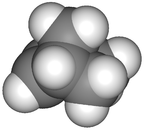Norbornene
Norbornene or norbornylene or norcamphene is a bridged cyclic hydrocarbon. It is a white solid with a pungent sour odor. The molecule consists of a cyclohexene ring with a methylene bridge between carbons 1 and 4. The molecule carries a double bond which induces significant ring strain and significant reactivity.
| |||
 | |||
| Names | |||
|---|---|---|---|
| Preferred IUPAC name
Bicyclo[2.2.1]hept-2-ene | |||
| Other names
Norbornylene Norcamphene | |||
| Identifiers | |||
3D model (JSmol) |
|||
| ChemSpider | |||
| ECHA InfoCard | 100.007.152 | ||
| EC Number |
| ||
PubChem CID |
|||
| UNII | |||
CompTox Dashboard (EPA) |
|||
| |||
| |||
| Properties | |||
| C7H10 | |||
| Molar mass | 94.157 g·mol−1 | ||
| Appearance | White solid | ||
| Melting point | 42 to 46 °C (108 to 115 °F; 315 to 319 K) | ||
| Boiling point | 96 °C (205 °F; 369 K) | ||
| Hazards | |||
| NFPA 704 (fire diamond) | |||
| Flash point | −15 °C (5 °F; 258 K) | ||
Except where otherwise noted, data are given for materials in their standard state (at 25 °C [77 °F], 100 kPa). | |||
| Infobox references | |||
Production
Norbornene is made by a Diels–Alder reaction of cyclopentadiene and ethylene. Many substituted norbornenes can be prepared similarly.[2][3] Related bicyclic compounds are norbornadiene, which has the same carbon skeleton but with two double bonds, and norbornane which is prepared by hydrogenation of norbornene.
Reactions
Norbornene undergoes an acid-catalyzed hydration reaction to form norborneol. This reaction was of great interest in the elucidation of the non-classical carbonion controversy.
Norbornene is used in the Catellani reaction and in norbornene-mediated meta-C−H activation.[4]
Certain substituted norbornenes undergo unusual substitution reactions owing to the generation of the 2-norbornyl cation.
Polynorbornenes
Norbornenes are important monomers in ring-opening metathesis polymerizations (ROMP). Typically these conversions are effected with ill-defined catalysts. Polynorbornenes exhibit high glass transition temperatures and high optical clarity.[5]
 ROMP reaction giving polynorbornene. Like most commercial alkene metathesis processes, this reaction does not employ a well-defined molecular catalyst.
ROMP reaction giving polynorbornene. Like most commercial alkene metathesis processes, this reaction does not employ a well-defined molecular catalyst.
In addition to ROMP, norbornene monomers also undergo vinyl-addition polymerization, and is a popular monomer for use in Cyclic olefin copolymers.
Polynorbornene is used mainly in the rubber industry for anti-vibration (rail, building, industry), anti-impact (personal protective equipment, shoe parts, bumpers) and grip improvement (toy tires, racing tires, transmission systems, transports systems for copiers, feeders, etc.)
Ethylidene norbornene is a related monomer derived from cyclopentadiene and butadiene.
References
- Norbornene MSDS
- Binger, Paul; Wedemann, Petra; Brinker, Udo H. "Cyclopropene: A New Simple Synthesis and its Diels-Alder Reaction with Cyclopentadiene". Organic Syntheses.; Collective Volume, 10, p. 231
- Oda, Masaji; Kawase, Takeshi; Okada, Tomoaki; Enomoto, Tetsuya. "2-Cyclohexene-1,4-dione". Organic Syntheses.; Collective Volume, 9, p. 186
- Thansandote, Praew; Chong, Eugene; Feldmann, Kai-Oliver; Lautens, Mark (21 May 2010). "Palladium-Catalyzed Domino C−C/C−N Coupling Using a Norbornene Template: Synthesis of Substituted Benzomorpholines, Phenoxazines, and Dihydrodibenzoxazepines". The Journal of Organic Chemistry. 75 (10): 3495–3498. doi:10.1021/jo100408p. PMID 20423091.
- Delaude, Lionel; Noels, Alfred F. (2005). "Metathesis". Kirk-Othmer Encyclopedia of Chemical Technology. Weinheim: Wiley-VCH. doi:10.1002/0471238961.metanoel.a01. ISBN 978-0471238966.


